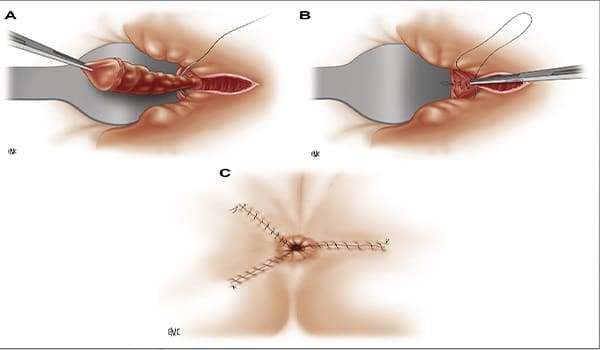Hemorrhoidectomy – Overview
Hemorrhoidectomy is a surgical procedure to remove hemorrhoids that have become inflamed or swollen thus causing pain and discomfort.
Hemorrhoid surgery is recommended for hemorrhoids that are extensive and persist with other measures such as over-the-counter medicines.
Surgery usually cures hemorrhoids. However, the long-term success of hemorrhoid surgery depends a lot on how well the patient is able to change the daily bowel habits to avoid constipation and straining.
About 5 out of 100 people who have hemorrhoids come back after surgery.
Types of Hemorrhoidectomy

There are different types of Hemorrhoid surgery depending on the procedure and techniques. They include:
Closed Hemorrhoidectomy
Closed hemorrhoidectomy is the surgical procedure most commonly used to treat internal hemorrhoids.
It consists of the excision of hemorrhoidal bundles using a sharp instrument, such as a scalpel, scissors, electrocautery, or even laser followed by complete wound closure with absorbable suture.
Typically all three hemorrhoidal columns are treated at one time. Postoperative care includes frequent sitz baths, mild analgesics, and avoidance of constipation. Closed hemorrhoidectomy is successful 95% of the time.
Open Hemorrhoidectomy
In an open hemorrhoidectomy, hemorrhoidal tissue is excised in the same manner as in a closed procedure, but here the incision is left open.
Surgeons may opt for open hemorrhoidectomy when the location or amount of disease makes wound closure difficult or the likelihood of postoperative infection high. Often, a combination of open and closed techniques is utilized.
Stapled Hemorrhoidectomy
Stapled hemorrhoidectomy, also known as stapled hemorrhoidopexy, involves the removal of much of the abnormally enlarged hemorrhoidal tissue, followed by a repositioning of the remaining hemorrhoidal tissue back to its normal anatomical position.
It is generally less painful and is associated with faster healing compared to the complete removal of hemorrhoids.
However, the chance of symptomatic hemorrhoids returning is greater than for conventional hemorrhoidectomy, so it is typically recommended only for grade II or III disease.
Risks and Complications
Like every surgical procedure, there is a risk of complications with Hemorrhoid surgery. These risks and complications include:
- Bleeding: There is a risk of excessive bleeding as a result of the surgery.
- Infections: There is a risk of infection from pathogens such as bacteria, fungi, viruses, etc.
- Urinary retention: Urinary retention is an inability to empty the bladder. This may occur due to the proximity of the rectum to the nerves that supply the bladder.
- Fecal incontinence: Although rare, with rates ranging from 0%-10%, there is a risk of fecal incontinence. This is a condition whereby there is a lack of control over defecation, leading to involuntary loss of bowel contents both liquid stool elements and mucus or solid feces.
- Anal stenosis
Hemorrhoidectomy Cost
The total cost for Hemorrhoid surgery depends on a lot of factors such as the anesthetic fee, private hospital fee, private operating facility fee, the extent of surgery required. The total cost of the procedure is around $3,049 to $5,965.
Hemorrhoidectomy Recovery Tips
The recovery time for these procedures varies.
Procedures that restrict the blood supply to hemorrhoids require several days afterward for hemorrhoids to fall off.
The wound can then take 1 to 2 weeks to fully heal.
Hemorrhoid banding can take two to four procedures to remove hemorrhoids entirely. The procedures are usually 6 to 8 weeks apart.
The recovery time for surgical procedures that remove hemorrhoids varies. It can take 1 to 3 weeks to make a full recovery.
Following surgery, people can help their recovery by doing the following:
- eating a fiber-rich diet
- avoiding sitting for long periods
- drinking plenty of water
- taking a Sitz bath
- not straining during a bowel movement
- avoiding regular, heavy lifting
- avoiding long periods of sitting
These changes will reduce the likelihood of hemorrhoids recurring in the future.
More: Scalenectomy


